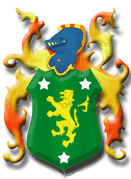


History of the surname:
It must be emphasized at once that the name Lynch, which is among the hundred commonest surnames in Ireland, is of dual origin. Lynch is used as the anglicized form of the native Gaelic names O Loingsigh, and also of the Norman de Lench. the Norman family of Lynch, though far less numerous than their Gaelic name-sakes, have been more prominent on account of their predominance in the affairs of Galway city, where they were the most influential of the "Tribes". In the hundred and seventy years which elapsed between 1484, when Dominick Lynch procured the city's charter from Richard III, and 1654, when Catholics were debarred from civic offices, no less than eighty-four mayors of Galway were of the family of Lynch. Dominick's son, Stephen Lynch, was in turn responsible for obtaining from Pope Innocent VIII the Bull which established that unique ecclesiastical institution, the Wardenship of Galway. Many of the Wardens were Lynches. The Galway family also produced a number of distinguished ecclesiastics, the most famous of whom were Rev. John Lynch (1599-1673), the author of Cambrensis Eversus: the centenarian Archbishop of Tuam, Most Rev. James Lynch, D.D. (1611-1676), the author of many works in Spanish ; and Rev. Dominic Lynch (d. 1697), the Dominican philosopher. Of all the Galway Lynches the one most likely to be remembered by any visitor to that city is James Lynch, the stern mayor who in 1493 felt it his duty to hang his own son for an offence for which the penalty was death: the spot where this event took place, known as the gate of the Old Jail, with its tragic inscription, is still pointed out and the story retold. it should be noted, however, that some modern Galway historians have suggested that this story may be apocryphal. Nearby is Lynche's Castle which was built in 1320. After the coming of the Normans, the Leyns (Lynch) family was first settled in Meath, where Lynch's knock, the site of a battle in 1647, perpetuates their occupation. It was a branch of this family that migrated to Galway in the early fifteenth century. The arms illustrated on Plate XIX are those of the Lynches of Galway. Branches of this family have been prominent among the modern landowners in Co. Galway under the hyphenated names Lynch-Blosse and Blosse-Lynch. the Gaelic Lynches, formerly often called O'Lynch, comprise a number of quite distinct and independent septs, most of which were submerged as such after the Anglo-Norman invasion but whose descendants are still to be found in their several places of origin. The Thomond sept produced Clare-born Patrick Lynch (1757-1818), linguist and Gaelic scholar. The Sligo sept has Alan O'Lynch, noted Dominican Prior of Kildare (1411), to its credit. From that of Breffny came Dr. John Joseph Lynch (1816-1888), Bishop of Toronto, the first Catholic ecclesiastical dignitary to attend a British royal levee since the time of James II. Col. Charles Lynch (1736-1796), from whose name the American word to lynch, or "lynch law", was coined, was son of another Charles Lynch, scion of the northern sept whose head in early mediaeval times was chief of Dalriada. The Lynches of Co. Donegal are properly Mac Loingseachain *Lynchehaun); those, O Loingsigh (of Lynch), now numerous in Cork, Kerry and Limerick, probably stem from the septs of the name located in Corca; Laoidhe and in Owney. Thomas Lynch (1749-1779), the youngest of the signatories of the American Declaration of Independence, was of an Irish family which had then been three generations in America. Count John Baptist Lunch, a peer of France, was grandson of an officer who went to that country with James II: he lost all in the French revolution but later recovered some of his property. General Isodore Lynch, who joined the revolutionary army, had a distinguished military career in the French service. Patrick (Patricio) Lynch (1824-1886) "son of a wealthy Irish merchant" who first saw service in the British navy, has been described as "the foremost Chilean naval hero". Finally we may mention Hannah Lynch (1862-1904), a leading figure in the Ladies' Land League.
Last Updated : Wednesday, August 28, 2002 5:06 PM